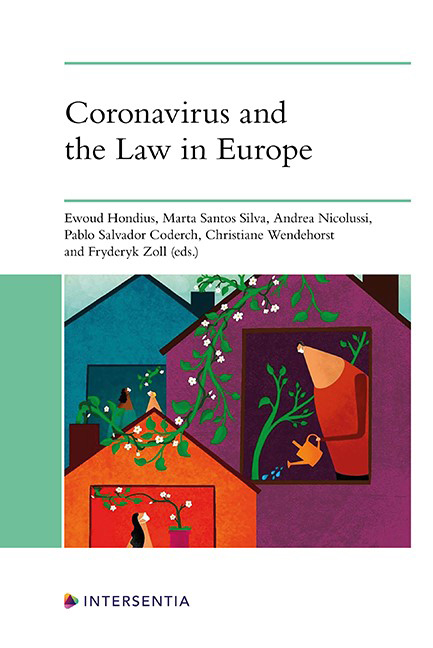Book contents
- Frontmatter
- Preface
- Contents
- List of Keywords
- List of Contributors
- PART I COVID-19 AND FUNDAMENTAL RIGHTS
- PART II STATES AGAINST THE PANDEMIC
- PART III COMPENSATION FOR COVID-19 RELATED DAMAGE
- PART IV CONTRACT LAW
- PART V CONSUMER LAW
- PART VI LABOUR AND SOCIAL LAW
- PART VII CORONAVIRUS CHANGING EUROPE
- Epilogue
- Annex: ELI Principles for the COVID-19 Crisis
- About the Editors
A Lithuanian Experience of Coronavirus and the Law
Published online by Cambridge University Press: 10 December 2021
- Frontmatter
- Preface
- Contents
- List of Keywords
- List of Contributors
- PART I COVID-19 AND FUNDAMENTAL RIGHTS
- PART II STATES AGAINST THE PANDEMIC
- PART III COMPENSATION FOR COVID-19 RELATED DAMAGE
- PART IV CONTRACT LAW
- PART V CONSUMER LAW
- PART VI LABOUR AND SOCIAL LAW
- PART VII CORONAVIRUS CHANGING EUROPE
- Epilogue
- Annex: ELI Principles for the COVID-19 Crisis
- About the Editors
Summary
As in many other countries of the world, the pandemic of the coronavirus came to Lithuania unexpectedly, both for society as a whole and the public authorities, as well as for the country’s health system and business. Although the Government decided quickly enough to introduce quarantine, discussions have arisen upon the Government’s powers to introduce quarantine. The introduction of quarantine has raised not only the problem of the distribution of competence between Parliament and the Government but also many other issues in both public and private law. The pandemic has shown that many pieces of legislation do not provide for the specificities of legal regulation in quarantine or other extreme situations. As a result, both Parliament and the Government have had to adopt a number of new laws and other legal acts or amend legislation already in force during the pandemic. The pandemic has also shown weak support from the European Union and its institutions and as a result of this, the Member States have, in practice, dealt with pandemic problems on their own rather than centrally. For this reason, trust in the European Union could be further weakened.
INTRODUCTION
As of 9 March 2021, Lithuania, with an estimated population of approximately 3 million inhabitants, recorded 202,900 people with coronavirus disease and 3,341 deaths due to coronavirus. The Government responded to the impending threat of coronavirus by introducing a state-level of extreme situation by its Decree No. 152 of 26 February 2020. By Prime Ministerial decree, the Head of State Operations of State-level Extreme Situation was appointed Minister of the Health Protection. The Law on Civil Safety was the legal basis of the state of extreme situation. The Government declared the Republic of Lithuania in quarantine and approved the quarantine regime by the Decree of the Government No. 207 of 14 March 2020, in accordance with the Law on Civil Safety and the Law on Human Communicable Diseases Prevention and Control. The quarantine regime has been relaxed several times since March and was lifted on 17 June 2020. However, the state-level extreme situation remains in force. However, due to the increase in the number of infections, a new quarantine was introduced by the Decree of the Government No. 1226 of 4 November 2020 and remains valid until now.
- Type
- Chapter
- Information
- Coronavirus and the Law in Europe , pp. 201 - 218Publisher: IntersentiaPrint publication year: 2021
- 1
- Cited by



